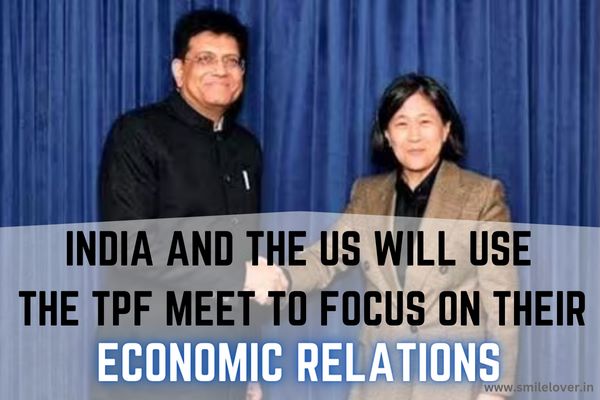INDIA AND THE US WILL USE THE TPF MEETING TO CONCENTRATE ON THE "BIG PICTURE" OF THEIR ECONOMIC RELATIONS

Washington: According to Union Minister for Industry and Commerce Piyush Goyal, the US and India have resolved to use the Trade Policy Forum (TPF) ministerial meetings to concentrate on the overall trade relationship rather than get bogged down by squabbling over specifics of market access.
Deepening ties in semiconductor manufacture and defence production are now a major focus of the relationship. Goyal made the apparent reference to China when he added that India, unlike other nations, "does not steal technology." An India-US FTA was not a topic of discussion, he continued, due to the political decision made by the US not to negotiate any free trade agreements with any nations.
In response to a question from HT about whether the TPF achievements had been incremental and thus disappointing, even though the goal and substance of the discussions were encouraging, Goyal stated that the two countries now envisioned the forum in a different framework.
Market access concerns are not addressed in the TPF's elaboration. I and Katherine Tai, the US Trade Representative, agreed that we should let the officials focus on and continually develop those details," Goyal added.
The mini-trade deal that was formerly contemplated between the two countries or in earlier conversations had the terms "one is to one, we will open table grapes for you, you open mangoes for me...level of the discussion," he continued.
"Katherine Tai and I concluded that this is not the time or age to consider giving each other one thing and then settling differences. We both concurred that we should consider the larger picture and what is best for both nations. At the ministerial level, we established the framework within which the officials would later find day-to-day answers. We didn't think it was appropriate to state on paper, moving ahead, that I do this for mangoes, you do this for grapes, and you do this for pigs. These are matters for officials to resolve.
According to Goyal, there is ongoing work amongst several agencies and departments, and there has been progressed on many of these concerns.
We pay attention to the big picture. Respecting one another's sensibilities is important, but it shouldn't stop us from moving forward and hastening our local results. Let's leave this one-to-one ratio-based outcome behind.
Goyal compared India's credentials with others while citing semiconductor manufacturing and defence as instances of what he called the "big picture."
"We are considering considerably closer cooperation with the US on chip production. Numerous American businesses are considering the significant Indian prospect for defence production, which will make it competitive and provide a chance to access the sizable Indian market where we are supporting made-in-India items. They feel at ease doing business with India since, in contrast to other nations, we don't steal technology.
The minister stated that India respected the value of technology, permitted businesses to keep their technology, did not require technology transfer, and noted that while India allowed 74% ownership in the automatic route for the production of defence goods, it even permitted 100% ownership on a case-by-case basis in a timely manner. "
Our focus during our talks with Tai and Gina Raimondo, the secretary of commerce, has been on the broader picture. In light of this, I would disagree that it is more about intent than actual results. This time, I believe there will be a more substantive result than there was before since we have established the guidelines upon which this engagement may proceed quickly.
Goyal said in response to a different question on the fate of a small trade pact that was discussed with the previous Trump administration that it was "too little" to warrant much work on both sides. The majority of these difficulties have even been forgotten, and we now have much higher goals for our trade with the US.
The minister emphasised that although the US has not looked at any free trade agreements with any countries "as a matter of their political agenda," India has recently inked a number of such agreements. Therefore, that is not an option. Small, insignificant trade deals are no longer important because we are concentrating on expanding market access and making it easier to conduct business.









